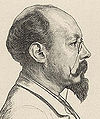A thought that came up while reading the book (unfortunately in danish).Det er i livet nu engang sådan
at der i allerhøjeste grad ikke findes lykken
som vi mener at den burde se ud.

Someone said somewhere that Emants writes rather scientific and perhaps even cold, and Liefdeleven (1916) by Marcellus Emants (1848-1923) reminds me indeed a bit of a scientific study. Emants is known to write about actual persons and situations, and it is generally thought that Liefdeleven is about his third marriage (1904) with a German actress (the name of the main character “Christiaan Duyts” – Duyts meaning “German” in dutch- seems to support this).
I must say that I found it a little hard to get through the first chapters, as it at that point reminded me of a nurse-loves-doctor kind of pocket that comes with the latest ladies magazine.
But as the story progresses it becomes more naturalistic to an extend that it even gets hard to be confronted by many of the conversations/discussions in this part of the book. It was here that I started to suspect that the book referred to, or at least has pieces of, an actual situation in the life of Marcellus Emants.
The book is written from a male perspective which gives it a perhaps interesting one-view-only look upon the problems that arise in the book. It doesn’t help that in a key section of the book (The conversation with doctor Diepe – “Diep” means “Depth” in dutch) one reads about the opinion of another male, who is not exactly taking a female point of view.
After that I got curious to know what would happen next and I did not get disappointed.
I actually don’t think the book is much about how bad it is to be married, or how hard it can be when you meet the wrong person. I think the book is about the reality of life. Some people are lucky and can keep their dreams alive, can be happily married, have a good job so that they never have to suffer in whatever way. They can continue being happy. But what about war, poverty, disaster, crime, sickness or, to a lesser extend, divorce, loneliness or discrimination? These are all aspects of life, and one can argue whether or not a person should experience at least some of these things to experience what life is really about. People that are being born happy and that die happy are lucky and I wish everybody could experience that. But we are part of nature, and nature is not just one happy story.
Life is full of lies, dreams, promises. We all live a lie, and many of us will unravel a few of those lies.
A sidenote:
I think there is a little bit too big a gap between the description of nature in beautiful,original words, very poetic, and the rest of the story. Christiaan is a painter of landscapes, hence the descriptions, but for me it doesn’t really fit into the story. It’s slightly out of tone. It does make me want to try to create poems out of the descriptions though.